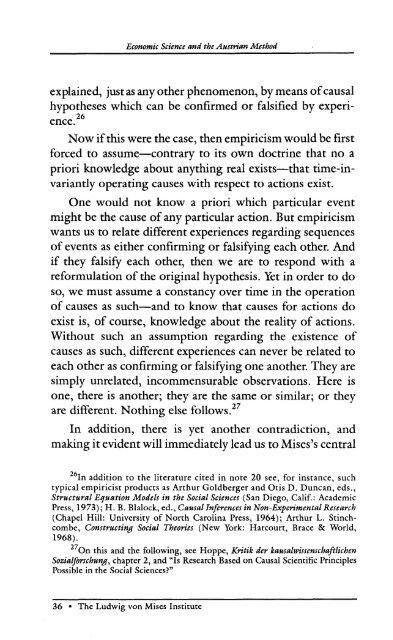Economic Science and the Austrian Method_3
Economic Science and the Austrian Method_3
Economic Science and the Austrian Method_3
- No tags were found...
You also want an ePaper? Increase the reach of your titles
YUMPU automatically turns print PDFs into web optimized ePapers that Google loves.
<strong>Economic</strong> <strong>Science</strong> <strong>and</strong> <strong>the</strong> <strong>Austrian</strong> <strong>Method</strong>explained, just as any o<strong>the</strong>r phenomenon, by means ofcausalhypo<strong>the</strong>ses which can be confirmed or falsified byexperience.26Now ifthis were <strong>the</strong> case, <strong>the</strong>n empiricism would be firstforced to assume-contrary to its own doctrine that no apriori knowledge about anything real exists-that time-invariantlyoperating causes with respect to actions exist.One would not know a priori which particular eventmight be <strong>the</strong> cause ofany particular action. But empiricismwants us to relate different experiences regarding sequencesof events as ei<strong>the</strong>r confirming or falsifying each o<strong>the</strong>r. Andif <strong>the</strong>y falsify each o<strong>the</strong>r, <strong>the</strong>n we are to respond with areformulation of <strong>the</strong> original hypo<strong>the</strong>sis. Yet in order to doso, we must assume a constancy over time in <strong>the</strong> operationof causes as such-<strong>and</strong> to know that causes for actions doexist is, of course, knowledge about <strong>the</strong> reality of actions.Without such an assumption regarding <strong>the</strong> existence ofcauses as such, different experiences can never be related toeach o<strong>the</strong>r as confirming or falsifying one ano<strong>the</strong>r. They aresimply unrelated, incommensurable observations. Here isone, <strong>the</strong>re is ano<strong>the</strong>r; <strong>the</strong>y are <strong>the</strong> same or similar; or <strong>the</strong>yare different. Nothing else follows. 27In addition, <strong>the</strong>re is yet ano<strong>the</strong>r contradiction, <strong>and</strong>making it evident will immediately lead us to Mises's central261n addition to <strong>the</strong> literature cited in note 20 see, for instance, suchtypical empiricist products as Arthur Goldberger <strong>and</strong> Otis D. Duncan, eds.,Structural Equation Models in <strong>the</strong> Social <strong>Science</strong>s (San Diego, Calif.: AcademicPress, 1973); H. B. Blalock, ed., Causal Inferences in Non-Experimental Research(Chapel Hill: University of North Carolina Press, 1964); Arthur L. Stinchcombe,Constructing Social Theories (New York: Harcourt, Brace & World,1968).27On this <strong>and</strong> <strong>the</strong> following, see Hoppe, Kritik der kausalwissenschaftlichenSozialforschung, chapter 2, <strong>and</strong> "Is Research Based on Causal Scientific PrinciplesPossible in <strong>the</strong> Social <strong>Science</strong>s?"36 • The Ludwig von Mises Institute


